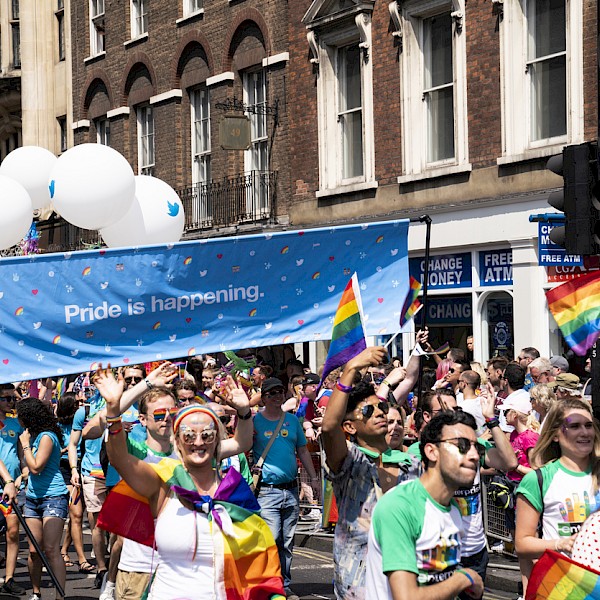Building LGBT+ inclusivity into the workplace



By and large, it’s now agreed that openly intolerant behaviour is unacceptable in the workplace. Going a step further, though, organisations are increasingly aware of the importance of diversity in bringing different voices, attitudes and perspectives to the table – something that is ever more important in a highly competitive commercial world. What’s more, for businesses seeking to attract the most talented candidates out there, it’s critical to pursue inclusion, spanning race, gender and sexuality.
Many businesses celebrated LGBT Pride Month this June, in the year that marks the 50th anniversary of the Stonewall riots of 28 June, 1969 (the date of which is commemorated by Pride Month’s placement in the calendar). Is this enough though?


Attitudes are changing, says Julia Atwater, Head of communications, B&PS UK&I at Atos and co-founder of the AtosPride LGBT and Allies Network. “I think companies are realising that they can’t just march in a Pride parade or give out rainbow lanyards to create a culture of inclusion for LGBT+ employees,” she says. “Employers are coming up with frequently more creative ways to tangibly improve LGBT+ equality and create that culture of inclusion.”
Inclusivity isn’t necessarily simple, though. “Some – not all – companies are becoming more aware of the importance of intersectionality,” says Julia. “[That means] recognising that people have different identities and the LGBT+ community itself is incredibly diverse. At Atos we work hard to continue to learn and share best practice with other organisations to build the right culture. The Atos LGBT+ and Allies network works closely with all of the diversity and inclusion networks in Atos all year round and this culminates in the annual Atos Diversity and Inclusion Expo… The Expo has definitely helped that culture of inclusion as we educate and empower our staff on diversity and inclusion topics and the relevance in the workplace. We can’t expect our staff to know all this information if they have not had those diverse experiences themselves.”


And LGBT+ inclusivity is by no means a taboo topic in the workplace of today – after all, anti-discrimination legislation means that diversity has to be addressed (and companies that refuse to are inviting significant legal risks). “I think many employers are wise to the fact they need to embrace the LGBT+ community and as part of that, it means absolutely zero tolerance on discrimination; however, in the UK, this is written into law,” notes Julia. The situation is more complex for international businesses, though – with different countries coming with their own laws and cultures.
“In other countries around the world [discrimination is not forbidden by law] and is absolutely still the elephant in the room,” says Julia. “Atos currently operates in over 70 countries and we have AtosPride members in 32 different countries, including some where it is either legally or culturally unacceptable to be publicly LGBT+. Earlier this year, Atos pledged support for LGBT+ rights at work by signing the United Nations Standards of Conduct for Business. This is a positive step but the journey to full LGBT+ inclusion worldwide will be a long one.”


So what steps can companies take to embrace diversity and inclusion?
Julia points to advice on inclusive recruitment practices, such as ensuring that there are diverse interviewers and panels and that all hiring managers undertake unconscious bias training; and being clear on what the interview process is and how long each stage takes. “Accommodating people with different needs should be a given, [as well as] offering alternative options and flexibility such as offering video calls,” notes Julia. Other changes, meanwhile, can be more subtle. Job descriptions should be reviewed, for example, to remove gendered language and to cut requirements (such as specified working hours or in-office time) where they aren’t actually required. It’s also worth keeping an open mind on whether someone may be right for the job. “Just because someone doesn’t have a degree in computer science does not mean they can’t succeed in tech,” she says.
Nevertheless, getting things right at the start has a huge impact. “To ensure an inclusive working environment beyond the hiring process takes a lot of work and needs to reflect on the employee lifecycle,” says Julia. “One key part is the induction process. If you’re not sending proactive inclusive messages at induction, you risk having LGBT+ employees going back into the closet before they even begin.”
But this is only the beginning. “Beyond induction, you need to ensure communications are consistently inclusive, which involves training,” Julia continues. “Use data and monitoring to improve talent management so that you are progressing diverse talent and identifying potential barriers, too. My biggest recommendation for companies is to highlight your role models and encourage them to tell their stories to change hearts and minds. We have had huge success in this area in Atos and I feel humbled by the experiences shared by our LGBT+ role models in Atos, all around the world.”
There are also practical details to consider – such as the company’s code of conduct; anti-harassment policies; and dress and grooming guides. At a more fundamental level, inclusive organisations should pursue inclusive language – opting for neutral terms such as ‘partner’ over husband or wife. Equally, this extends to the recognition of LGBT+ partners when it comes to partner benefits – such as for health insurance and paternity/maternity leave.


Businesses have clearly come a long way in embracing diversity – but there’s still much to do. 41% of LGBT+ people reportedly go back in the closet in their first jobs; and 21% say that being out or open at work is the ‘hardest thing they’ve done’. This underlines why it’s important to pursue inclusivity across the full stretch of the employee experience, from instilling inclusive hiring practices to identifying diversity champions and underlining the importance of inclusive language. With the right mindset, though, change is possible – and proactive organisations can make their workplaces truly equal for all.

Empiric is a multi-award winning business and one of the fastest growing technology and transformation recruitment agency's specialising in data, digital, cloud and security. We supply technology and change recruitment services to businesses looking for both contract and permanent professionals.

Read more (pdf download)
Empiric are committed to changing the gender and diversity imbalance within the technology sector. In addition to Next Tech Girls we proactively target skilled professionals from minority groups which in turn can help you meet your own diversity commitments. Our active investment within the tech community allows us to engage with specific talent pools and deliver a short list of relevant and diverse candidates.
For more information contact
02036757777